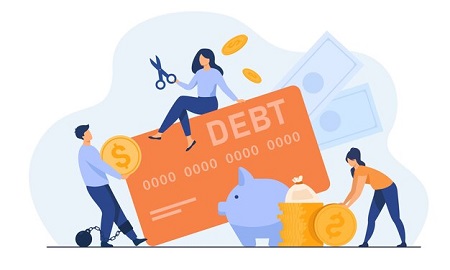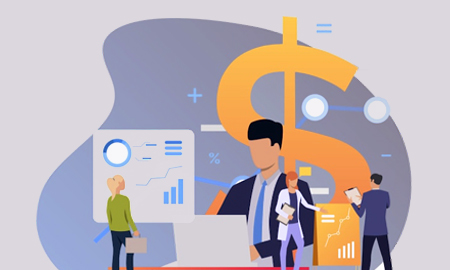Debt collection is a comprehensive process. Financial organizations that collect and process payments have a critical function when it comes to financial markets. Here, the Consumer Financial Protection Bureau (CFPB) is the primary nationwide regulator of the consumer debt collection industry. There has been a lengthy consideration of the impact of debt collection. Therefore, it was essential to pass a law for debt collection services. When passing the Fair Debt Collection Practices Act, Congress noted that abusive debt collection practices led to a number of personal bankruptcies, to marital fluctuation, loss of jobs and invasions of individual privacy.
It isn’t just consumers that are harmed by unfair debt collection practices. Congress also emphasizes for the FDCPA to safeguard law-abiding debt collection businesses so “debt collectors who withhold from using offensive debt collection procedures are not competitively disadvantaged.”
Small businesses are also impacted by debt collection harms. In fact, during the pandemic, many companies struggled to stay afloat. Some even got targeted; as a result, many small businesses realized themselves facing similar practices as those overlooked by consumers.
The Federal Trade Commission has taken numerous measures to combat unlawful collection practices that target small businesses. Basically, these activities are a reminder that businesses encountering abusive debt collection practices don’t essentially need to run sets of rights as families since many debts do not get protected by the Fair Debt Collection Practices Act.
It’s equally significant for policymakers to pay close attention to offenders targeting small businesses. Moreover, you can determine whether additional debt collection rights and protections should be provided for small businesses and entrepreneurs.

The Federal Trade Commission (FTC) has scheduled the following complete text of the Fair Debt Collection Practices Act.
Congressional conclusions and declarations of objective
Offensive practices
There’s excellent evidence of the use of offensive, deceitful and unfair debt collection practices by debt collectors. Abusive debt collection practices contribute to the number of personal bankruptcies, marital instability, job loss, and invasion of individual privacy.
Inadequacy of laws
Existing laws and procedures when redressing these injuries are inadequate to protect consumers.
Available non-abusive collection methods
This states that misrepresentation or other abusive debt collection practices are open to accumulating debts effectively.
Interstate commerce
Abusive debt collection practices are carried on to a considerable stretch in interstate commerce and through means and techniques of such business. Even where abusive debt collection practices are purely interstate in character, they nevertheless instantly impact interstate commerce.
Purposes
The purpose of the sub-chapter is to eradicate any offensive debt collection practices run by debt collectors. To ensure that those debt collectors who abstain from abusive debt collection practices are not competitively disadvantaged and encourage uniform State action to protect customers against debt collection misuses.
What the Fair Debt Collection Practices Act Communicates?
Contact with the consumer
Without prior approval of the consumer directly to the debt collector or the permission of a court of competent jurisdiction, a debt collector may not convey to a consumer the collection of any debt.
At any unusual time or place which could be unsuitable to the consumer, i.e., the convenient time shall be 8 o’clock ante-meridian and before 9 o’clock post-meridian.
If the debt collector knows the consumer is designated by an attorney concerning debt and has knowledge of, or can readily establish, the attorney’s name and address unless the attorney fails to reply within a reasonable period of time to interaction from the debt collector.
At the consumer’s place of employment, if the debt collector understands or has grounds to know that the consumer’s employer refuses the consumer from carrying such communication.

Interaction with third parties
Except as provided in section 1692b, without the consumer’s prior consent offered instantly to the debt collector, or the express permission of a court of competent jurisdiction, or as reasonably essential to effectuate a post judgement judicial remedy.
A debt collector may not communicate, in connection with the consumer, the attorney or a consumer reporting agency if otherwise authorized by law, the creditor, the attorney of the creditor, or the debt collector’s attorney.
Ceasing communication
A debt collector shall not convey any further with the consumer if they notify the debt collector in writing that the consumer declines to pay a debt. However, there are some exceptions,
- To notify the client that the debt collector’s further actions get closed
- To notify the consumer, the debt collector or creditor may summon limited remedies which are ordinarily invoked by debt collectors
- To notify the consumer that the debt collector or creditor plans to invoke a specified remedy
“Consumer” defined
For the purpose of the section, the term “consumer” here includes the consumer’s spouse, parent, guardian, executor, or administrator.
Harassment or Abuse
Debt collection services cannot engage in any conduct, the natural consequence of which is to harass, oppress, or abuse any person in connection with the collection of a debt. Without limiting the general application of the foregoing, the following conduct is a violation of the section,
The use or threat of violence or other criminal means to damage any person’s physical person, reputation or property.
The use of foul or profane speech or the natural consequence of which is to abuse the hearer or reader.
The listing of customers who allegedly decline to pay debts, except to a consumer reporting agency or persons fulfilling the requirements of section 1681(f) or 1681b(3) of the title.
The advertisement for the sale of any debt to coerce debt payment.
Causing a telephone to ring and engage any person in telephone discussion repeatedly or constantly with intent to annoy, abuse, or harass anyone at the called number.
Except as provided in section 1692b of this title, the placement of telephone calls without meaningful disclosure of the caller’s identity.
False or misleading presentations
Debt collection services have no right to utilize false, deceptive or misleading representation or means in connection with any debt collection. Now, without limiting the general application of the preceding, the following conduct is a violation of the section:
The false representation or essence that the debt collector is vouched for, bonded by, or affiliated with the U. S. or any State, including the use of any badge, uniform, or facsimile thereof.

The false representation of
- The character, amount, or legal status of any debt; or
- Any services rendered or compensation that any debt collector may lawfully receive for the collection of a debt
- Any services rendered or any debt collector may lawfully receive compensation for a debt collection.
- The false indication or implication that any individual is an attorney
- The representation or implication that nonpayment of any debt results in the arrest or imprisonment of any person or the seizure, garnishment, attachment, or sale of any property or wages of any person unless such action is lawful and the debt collector or creditor intends to take such action.
- The false representation or implication that a sale, referral or other transfer of any interest in a debt shall cause the consumer is oral, in that initial verbal communication, that the debt collector is attempting to collect a debt and that any information obtained will be used for that purpose.
- The false representation or implication that accounts have been turned over to innocent purchasers for value.
- The false representation or implication that documents are not legal process forms or do not require action by the consumer.
Unfair practices
No debt collection services may run unfair means to collect or attempt to collect any debt. The following conduct is a violation of the section,
The collection of any payment unless such amount is expressly approved by the arrangement creating the debt or permitted by law.
The acceptance by a debt collector for any person of a check or other payment instrument postdated by more than five days unless included when the person is notified in writing of the debt collector’s intent to deposit such a check or instrument. However, this must be ten or less three business days before such a deposit.
Depositing or threatening to deposit any postdated check or other postdated payment instrument prior to the date.
Charges are to be made to any person for communications by concealment of the true purpose of the communication.
Taking or threatening to take any nonjudicial action to effect dispossession or disablement of property when-
No right to possession of the property claimed as collateral through an enforceable security interest
There’s no intention to take possession of the property
The property is exempt by law from such dispossession or disablement
Communicating with a consumer regarding a debt by postcard.
Using any language or symbol apart from the debt recovery services’ address on an envelope when communicating with a consumer through the mail.
Validation of debts
Notice of debt
Within five days after the initial communication with a consumer in connection with the collection of any debt, a debt collector shall, unless the following information is contained in the initial contact or the consumer has paid the debt, send the consumer a written notice that contains-
The amount of the debt
The name of the creditor to whom the debt is owed
A statement that unless the consumer, within thirty days after receipt of the notice, disputes the validity of the debt or any portion thereof, is disputed, the debt collector will obtain verification of the debt or a copy of a judgement against the consumer and a copy of such verification or judgement will be mailed to the consumer by the debt collector.
Upon the consumer’s written request within thirty days, the debt collector will provide the consumer with the name and address of the original creditor.

Disputed debts
When the debtor notifies the collection agency in writing within thirty days, the debt collector shall cease collection of the debt or any disputed portion, or if the consumer requests the name and address of the original creditor, the debt collector shall stop the collection of the debt, or any disputed portion thereof, until the collector obtains verification of the debt or a copy of a judgement, or the name and address of the original creditor.
Collection activities and communications that do not otherwise violate the sub-chapter may continue during the 30 days referred to a collector in writing that the debt or any portion of the debt is disputed or that the consumer requests the name and address of the original creditor.
Admission of liability
Any court may construct the failure to dispute the validity of a debt under the section as an admission of liability by the consumer.
Legal pleadings
Communication in the form of a formal pleading in a civil action shall not be treated as an initial communication for purposes of the subsection.
Notice provisions
The sending or delivery of any form or notice does not relate to a debt collection. It is expressly required by title 26 V of the Gramm-Leach-Bliley Act, or any provision of Federal or State law relating to notification of data security breach or privacy or any regulation prescribed under any provision of law shall not be treated as an initial contact in reference with debt collection for purposes of the section.
Final Wrap
Expanding the Fair Debt Collection Practices Act to include debt collection appears to be another area where coordination efforts are happening between Congress and the agencies. It’s more about forcing consideration of significant policy shifts.
Expanding the scope of the FDCPA to cover collections would require a statutory change done through Congress and a signature from the president to enact the change into law. The small business Fair Debt Collection Protection Act aims to make the changes statutorily. However, it seems unlikely the legislation will advance in the Senate, regardless of whether there’s a passage out of the House Financial Services Committee and the United States House of Representatives.
You may also read our blog on “Why is it Important to Choose a PCI DSS Certified Call Center?“



